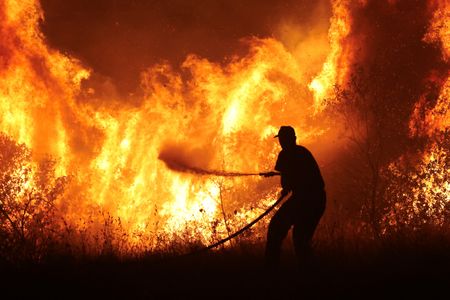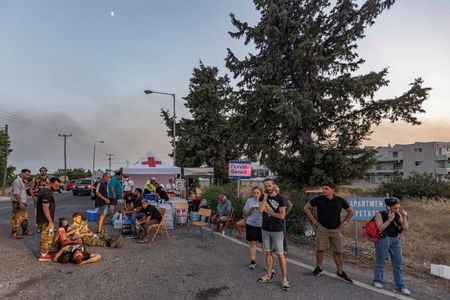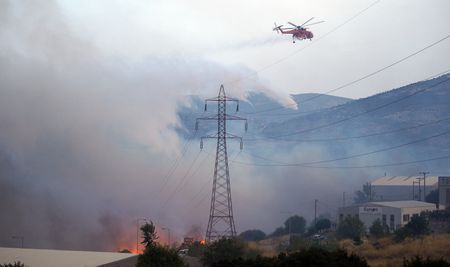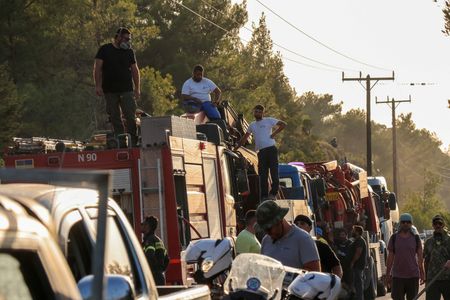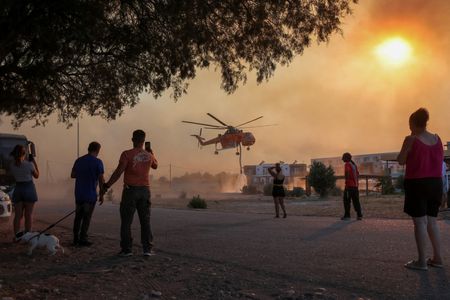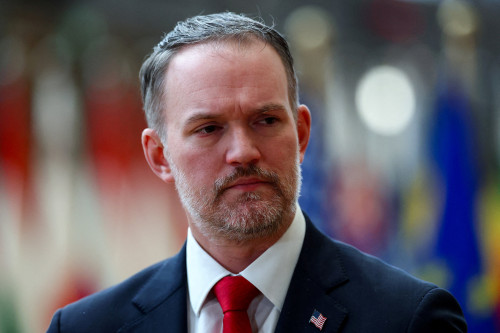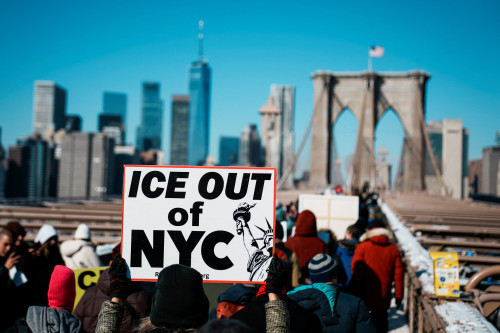By Karolina Tagaris and Alexandros Avramidis
VOLOS, Greece (Reuters) -Wildfires that have been supercharged by strong winds and temperatures exceeding 40 Celsius (104 Fahrenheit) killed two people in central Greece on Wednesday and forced a new wave of evacuations.
In the last 24 hours alone, 61 wildfires erupted across Greece, the fire brigade said. Officials ordered the evacuation of several communities in the hard-hit area of Magnesia, a coastal area north of Athens.
The body of a 45-year old shepherd was found in a rural area on Wednesday evening, the fire brigade said. Earlier, authorities had found the body of a woman, state TV ERT said. Both deaths were attributed to the fires.
Dozens of firefighters, assisted by 15 fire engines, were battling the flames as they threatened the industrial zone of the city of Volos, the regional capital. Firefighters circled the zone as they tried to protect it, a Reuters witness said.
The labour ministry urged employers in the area to suspend the operation of their businesses on Thursday.
A separate wildfire flared near the city of Lamia, south of Volos. Residents of several settlements were told to leave their homes.
Large areas of the Mediterranean have sweltered under an intense summer heatwave in recent days, and firefighters have been battling to put out blazes across the region, from Portugal to Sicily to Algeria.
On the Greek island of Rhodes, where more than 20,000 foreign visitors and locals fled seaside hotels and homes over the weekend, fires were beginning to abate on Wednesday, although firefighters were still trying to put out a wall of flames close to a mountainous area in Rhodes’ south that has burned uncontrolled for more than a week.
“The battle with the devastating fires continues on several fronts today by all Civil Protection forces in extreme conditions,” fire brigade spokesperson Ioannis Artopios said at a briefing. “Today is the most difficult day of this summer.”
Artopios said the risk of fire remained “extreme” for several areas of Greece on Thursday.
Climate Crisis and Civil Protection Minister Vassilis Kikilias said Greece was experiencing “very dangerous summer days.” The fires, he said, were fanned by strong winds and worsened by abnormally high temperatures, kindling fronts stretching for several kilometres.
“Given the climate crisis, we will again have extreme weather conditions that will again test our strength. Nothing is over, the battle will continue throughout the summer,” he said.
CONTAINING DAMAGE TO TOURISM
The government on Wednesday sought to contain damage to the reputation of one of its crucial revenue earners, tourism.
Greece is heavily reliant on its sea-and-sun tourist trade and Rhodes, one of its largest Aegean islands, is among its top destinations, attracting about 1.5 million foreign visitors in the summer months.
Around 3,000 tourists had left Rhodes to return home by plane by Tuesday, while tour operators cancelled upcoming trips. TUI dropped flights to Rhodes through Friday.
Tourism Minister Olga Kefalogianni stressed that wildfires had affected only a small part of the island.
“We have contacted the chamber of hoteliers and we want to see how we can bring people with holiday vouchers back,” she told Open television.
Firefighters were also tackling a blaze on the island of Evia, where two pilots were killed on Tuesday when their plane crashed into a hillside as it was dropping water onto the flames.
Wildfires in Greece are common in the summer, but hotter, drier and windier conditions, the result of climate change, have turned the country into a Mediterranean hotspot for fires in recent years.
President Katerina Sakellaropoulou and her Italian counterpart Sergio Mattarella discussed the issue over the phone and agreed to join forces to raise awareness in the European Union over the impact of climate change, the presidency said in a statement.
On Wednesday, the government shut the ancient Acropolis in Athens, one of the world’s most visited tourism sites, at 11 a.m. (0800 GMT) because of the searing heat.
“I am making a plea that no worker is out on the streets today. It will be the hottest day of the summer,” Labour Minister Adonis Georgiadis posted on messaging platform X, formerly known as Twitter.
Artopios, the fire brigade spokesperson, said that tackling the fires was a significant financial burden for Greece, with firefighting efforts on Rhodes alone costing about 7.5 million euros ($8.3 million) so far.
Greek wildfires released a record 1 megaton of carbon emissions between July 1 and July 25, the EU Copernicus Atmosphere Monitoring Service said.
That was nearly double the previous July 2007 record, with the smoke plumes fouling air quality in regions downwind.
($1 = 0.9040 euros)
(Additional reporting by Angeliki Koutantou, Renee Maltezou and Michele Kambas, Fedja Grulovic on Rhodes, Kate Abnett in Brussels; Editing by Mark Heinrich and Rosalba O’Brien)

